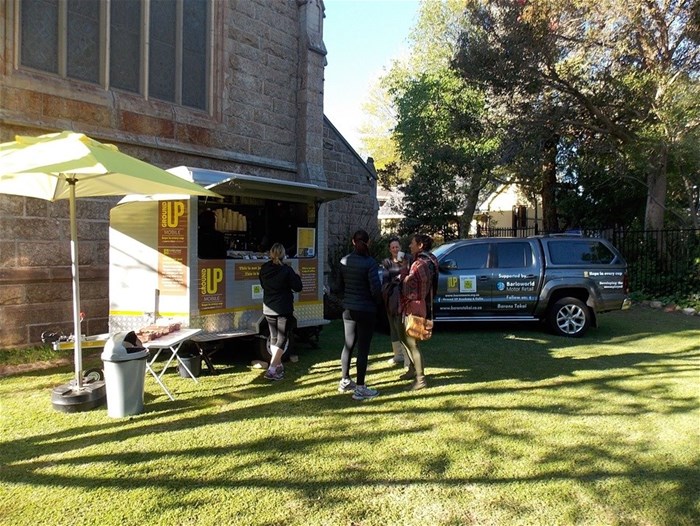
Top stories






More news


Marketing & Media
Ads are coming to AI. Does that really have to be such a bad thing?














This social enterprise resource is a new addition to Trialogue’s popular Knowledge Hub, which offers information on topics ranging from philanthropy to financial literacy. The Hub is mainly aimed at CSI corporate practitioners, as well as funders and other stakeholders. (http://www.trialogueknowledgehub.co.za/)
The topic is sponsored by Barloworld and offers research papers, business models, practical guides, case studies, and news and opinion articles. The knowledge partner, ensuring input is comprehensive, of a high quality and topical, is the Social Enterprise Academy South Africa.
There are several interpretations of ‘social enterprises’. Many are legally registered as non-profit organisations (NPOs), but incorporate business principles.
During a panel discussion at Trialogue’s Business in Society conference last year, Trialogue director Cathy Duff proposed defining a social enterprise as an organisation that is impact-driven and addresses social issues using sustainable business models. It creates some profits for reinvestment into the business, usually with both a social and a profit mission, in order to create social value.
South African social enterprises are based mainly in Gauteng and the Western Cape and the majority are involved in skills development (73%) and promoting education and literacy (66%). This is according to research just released by the Gordon Institute of Business Science (Social Enterprises in South Africa, May 2018). The findings are based on a final sample of 453 respondents.
Access to resources is the major challenge they face; 80% have an income of less than R500,000 a year. CSI is the highest source of income, followed by government entities and charitable foundations, ahead of the sale of products and services, according to GIBS research.
South African companies invest over R9bn a year in society, says Trialogue MD Nick Rockey. NPOs are the most popular channel for directing their CSI expenditure.
“Social enterprise is a new space for many corporate funders,” he says. “Companies want to explore the potential and challenges of such organisations, as well as the types of partnership and support they need. We hope our Knowledge Hub will enable them to learn from others who have walked this path, so that they can inform themselves and invest their much-needed funds optimally.”
Barloworld Head: CSI Vovo Ngcwabe says: “We are delighted to support the Knowledge Hub’s social enterprise topic. Many social enterprises make a real difference in their communities, in areas such as skills and youth development, and education.
“Companies, in turn, want to collaborate with social enterprises that are making an impact ‒ either in communities where the company is based, or which operate in a sector that matches corporate products or services.”
Barloworld provides vehicles to a number of NPO partner organisations such as Learn to Earn, which has the aim of developing unemployed people. Youth are trained at the Ground UP Barista Academy, while Ground Up Mobile’s coffee trailers can be found at St John’s church in Wynberg and Rondebosch Boys High School in Cape Town. A sponsored vehicle from Barons Tokai enables Ground UP to easily move its coffee trailers around the Cape Peninsula.
Social Enterprise Academy Africa Regional Manager Rachael Millson says: “Social enterprises come in many different shapes and forms. Nonetheless they all face the same fundamental question: Can they generate enough revenue and attract enough investment to cover their costs and grow their activities, and therefore their social impact?
“Corporate support for social enterprises is key. In particular we need better financial support for early-stage social enterprises, many of which find it tricky to access capital. Early-stage capital can drive capacity and ability to scale. It also enables deeper leadership development, providing a stronger chance of long-term success. Strong partnerships between corporates and social enterprises that are creative and mutually beneficial can be game-changing.”
Millson says corporate support is not limited to grant funding, citing TFG’s CSI partnership with Fashion for Change (another Learn to Earn project) as an inspiring example. Goods returned by customers, and excess merchandise, are either donated or sold to the Fashion for Change project to be sold in their shops. This provides unemployed youth with training in the retail trade.
“Financial innovations that will enable social enterprises to access a deeper pool of capital are also required. Loan guarantees, soft loans, quasi-equity, and social impact bonds can be part of the mix, allowing social enterprises to greatly extend their social reach and impact. When capacity building is combined with financial support, this becomes even more powerful.
“Non-financial practice, such as procurement, are equally important drivers of social enterprise. By procuring from social enterprises, especially those which are BBBEE level one rated, we can ensure that money spent on goods and services also provides societal benefit, and contributes towards improving the lives of people within our communities and country.”
Rockey concluded: “There is clearly plenty of scope for companies to get involved with social enterprises in a manner that suits their particular business models. We encourage them to investigate the Trialogue Knowledge Hub for information and ideas, and to share their own learnings with us.
Contact: To access the Knowledge Hub, see http://www.trialogue.co.za/knowledgehub. Companies interested in sponsoring a topic or contributing learnings and insights should contact Ruendree Govinder at az.oc.eugolairt@rednivogr.
Sources and references: Social Enterprises in South Africa ‒ discovering a vibrant sector May 2018 https://www.gibs.co.za/programmes/the-centre-for-leadership-and-dialogue/Documents/18103%20Stakeholder%20Report_FINAL.pdf
Trialogue 2017 Business in Society handbook http://trialogue.co.za/publications/csi-handbook-20th-ed-2017-free-download/
http://www.tfgcsi.co.za/blog/feel-good-project-0
www.socialenterprise.academy/za
Fashion for change: https://learntoearn.org.za/index.php/lte-retail-project/retail-project-overview
Learn to Earn Contact: 021 671 2230 or az.gro.nraeotnrael@ofni